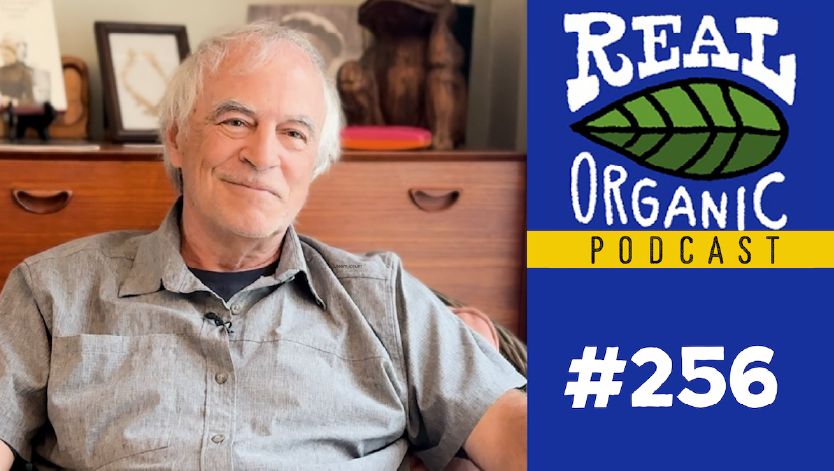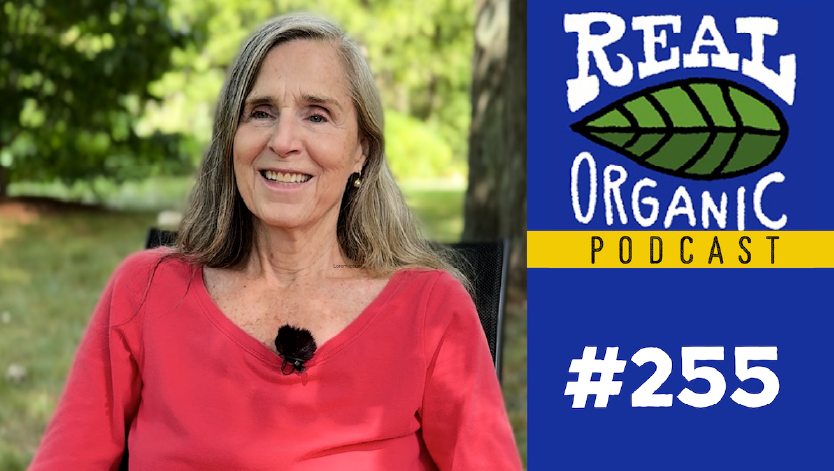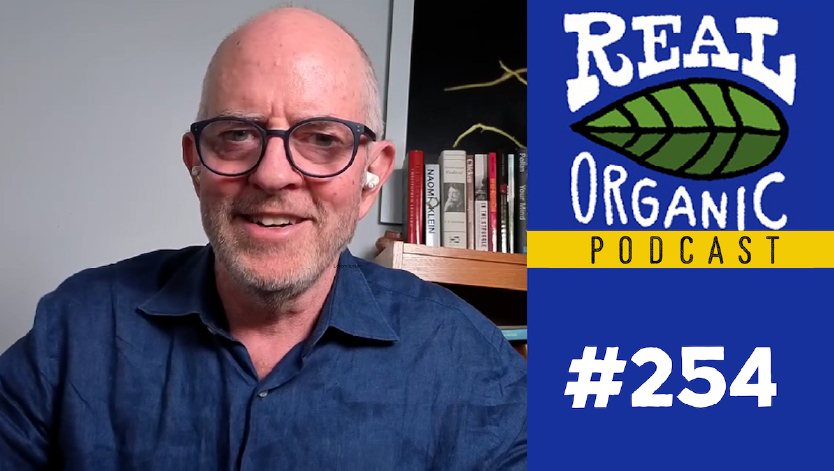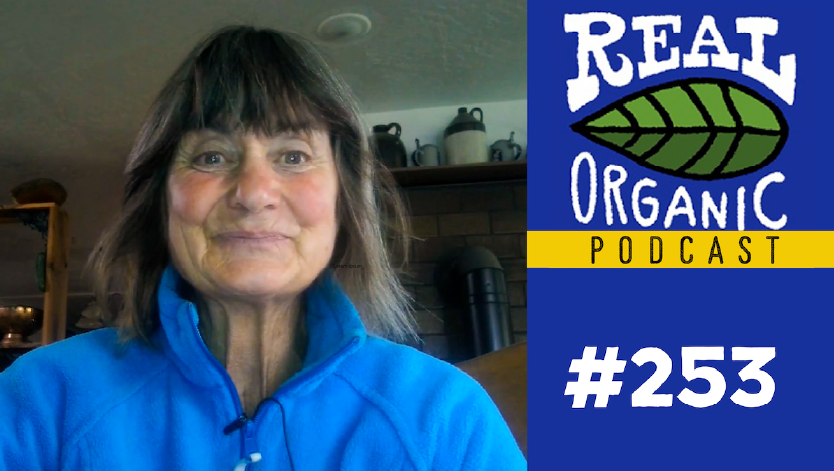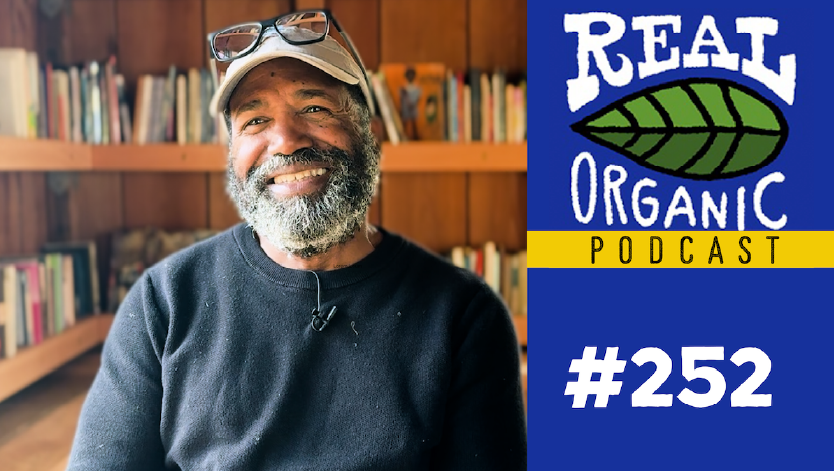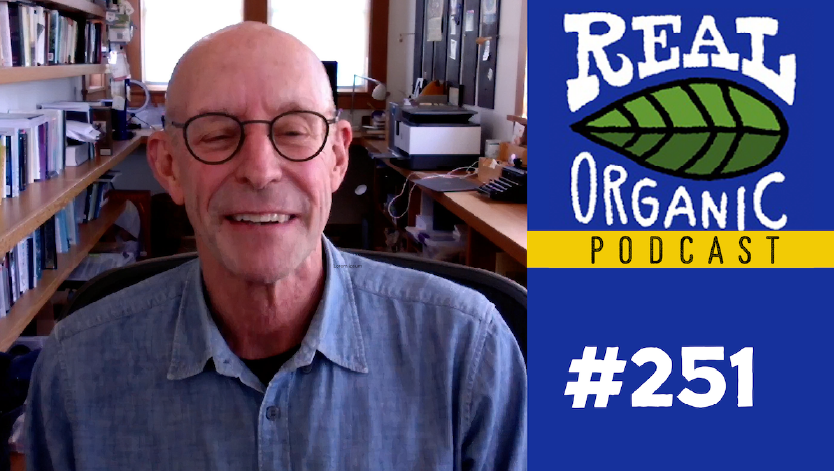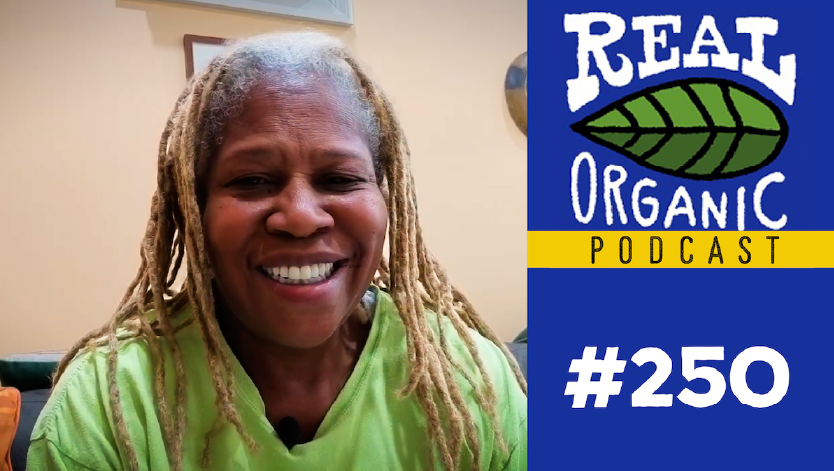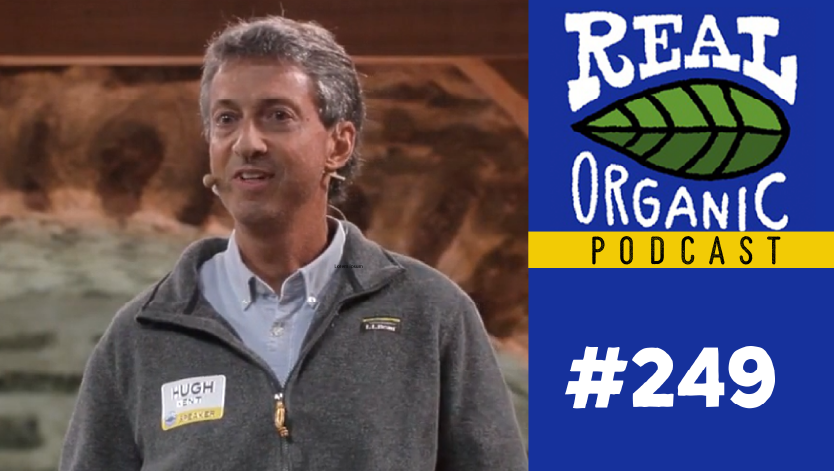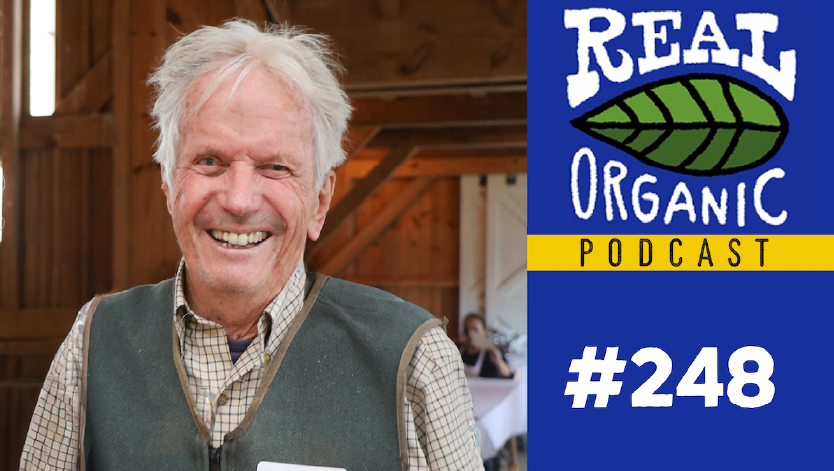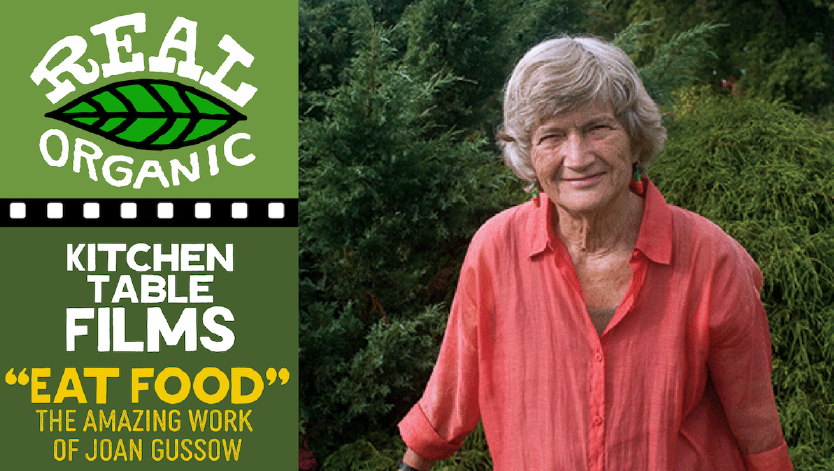Episode #226
Peter Segger: Farming Small, Thinking Big
Peter Segger offers an insider’s view of the Soil Association’s evolution, spotlighting the early debates that shaped organic certification and standards in the UK. As one of the young reformers on the Soil Association council in the 1970s and ’80s, Peter helped push for practical standards that could bring organic food to more people—without losing its soul. From clashing with the aristocratic elite in the organic movement to his role in getting organic produce into supermarkets, Peter shares a pivotal moment in the history of organic certification and its ongoing challenges in a world of greenwashing and issues of scale.
Our Peter Segger interview has been edited and condensed for clarity:
You can subscribe and download episodes of our show through your favorite podcast app, our YouTube channel, or stream the audio-only version here:
Dave Chapman interviews Peter Segger, Spring 2025:
Dave Chapman 0:00
Welcome to The Real Organic Podcast. I’m in the middle of a conversation with Peter Segger from Blaencamel Farm – I didn’t pronounce that perfectly because it’s Welsh – in Wales. Peter, it’s a pleasure. Peter, Patrick Holden led me to you because I asked Patrick…I really have become very interested in the writing of “Small is Beautiful.” He told me that you did know Fritz back in the day.
Peter Segger 0:49
Right.
Dave Chapman 0:52
I’m sort of jumping ahead a little – maybe first, your early days in farming. I think that you did not grow up in a farm family. How did you get the idea of getting into organic farming?
Peter Segger 1:09
This is a slightly long story, so I’ll try to make it as brief as possible. I grew up in Scotland and was educated in Scotland. I came down to London in ’63 and then did lots of things. When we were having a discussion, I asked you one time, “What did you do in your life before you became a grower?” and you said, “Lots of things.” It’s the same with me – lots of things, but none of them to do with farming. I never had any connection with farming other than I like to walk out amongst farms, particularly in Scotland.
Peter Segger 1:09
But I came down to London, and I did various things in the music industry and all sorts of things. I was supposed to be a scientist. That was what I was supposed to be – a physicist. But that didn’t really work out terribly well. I worked for the government’s scientific naval service, of all things, testing and stressing all sorts of different types of metals and plugging accelerometers into the hulls of submarines and all sorts of silly things like that.
Peter Segger 2:29
The end of my career in that came when I was working in my laboratory, and all these admirals came in – all dressed up and looking very smart and posh – then they pointed to me and said, “Who’s that girl over in the corner?” That was a time when any man who had long hair was referred to in an effeminate sort of manner. I thought, “I don’t want to live with people like that or work with people like that.” So I left.
Peter Segger 3:00
I went and got a job in the food industry. After a while, I succeeded in that, and it developed, and I became interested in food more and more and more. There’s a whole idea of food being a difficult thing to produce – because I also worked with fishing people – and a dangerous thing to produce. I watched people die. Producing food was a very, very sensitive, delicate, dangerous world. People didn’t really appreciate it very much. I didn’t, certainly not; neither did anybody else I knew.
Peter Segger 3:00
But I had moved from London out to the countryside and had an ancient, 500-year-old cottage – a very small, thatched cottage. I loved it, and I loved the farmers who surrounded me – I was in the middle of a farm. I kept going to the farmer and saying, “Well, would you like to become an organic farmer? I think you should. The market is…” I knew nothing at all.
Peter Segger 4:14
I had become vegetarian, and therefore, I had an interest in going to the farmers markets and buying my vegetables and things like that. So, you pick up ideas, no chemicals. Ah! terrible thing – chemicals. I was then telling this man he should become an organic farmer. The family had been farming for generation after generation. He was so kind and tolerant of me.
Peter Segger 4:41
I kept saying it, and eventually, after about a year, it got to a situation, he said, “Peter, I’m not changing. But if you really want to become an organic farmer, become one. Don’t just talk about it.” I thought, “That’s a good point.” I’m not sure if I’ve got an answer to that. I went out, I sold my business, and I didn’t get very much worth because it was right in the middle of a recession at the time – the country was going through terrible times. But I got enough.
Peter Segger 4:41
I sold my house that I dearly loved, and within a few months, I was traveling all over Britain looking for a small farm that I could find, but it had to be beautiful. I didn’t know anything about land, or soil, or anything like that, but I knew I needed to find something that was pretty, had flat fields so I could grow vegetables on it, and was not near to any big city.
Peter Segger 4:40
I found this place eventually in west Wales – right on the west coast of Wales. I could almost see the United States from where I live – not quite, obviously. That’s what I did. I came down to Wales, and I decided to start. I had no idea what to do, but we started and bought and read books. You would go out to plant peas, for example. So, you take about four or five gardening books to learn how to plant the peas and understand words like drill and throwing seeds into a drill, and what’s a drill, and all that sort of question.
Peter Segger 6:20
Anyway, we did that. Then, I got involved in trying to figure out how I would grow vegetables in this climate, which turned out to be contrary to what my expectations were – absolutely soaking wet with rain. Also the fields, when I bought them, they were lovely pastures of green, a verdant sort of picture. But it was raining. It rained for nine months solid, almost every single day. Rushes and weeds and things like that came up. Eventually dried up a bit. We plowed only to find the whole place was covered in borders, stones, and rocks.
Peter Segger 7:07
I remember the first time Patrick came to see the farm not long afterwards, and he said, “You will never grow vegetables in a land like that.” It was a sensible thing to say. Of course, he was wrong, but it was a sensible thing to say. But we were learning how to do it, and by one means or another, I eventually figured out a system of using ridges and drills to keep the plants above the ground and keep the stones down a bit. We were just practicing how we could grow… We started producing crops immediately, but not very much.
Peter Segger 7:49
Eventually, I got involved more and more, and then we gathered together a lot of people in Wales. I thought, “Well, if I don’t know how to do it, there must be other people around here who also don’t know how to do it. So, why don’t we come together to learn how to grow crops organically?” Because that was my objective – to grow crops organically.
Speaker 1 8:11
Peter, can I interrupt for a moment?
Peter Segger 8:32
Yeah.
Dave Chapman 8:32
Can I ask you, what year was it when you came to the land?
Peter Segger 8:35
1974.
Dave Chapman 8:22
I’m trying to put it in a context so that people can understand why there was not much information about organic farming available back then. There was information, I think, about organic gardening, but…
Peter Segger 8:37
There was some information about organic farming – in the sense that we know it – in cattle, beef, and arable crops because there were quite a few large-scale organic farmers in the Soil Association then. Some of them wrote books. There was quite a bit of information. But for horticulture, absolutely nothing at all. You could go nowhere to get anything. Since we didn’t know anybody, until we could build up a network of connections, we had nowhere to go to get anything.
Peter Segger 8:37
We decided to find a means of doing that. What I was feeling was basically the same as what everybody else all around the country. We had to find a way to find all these people. That was the work of the next few years – from ’74 onwards – up till… The big breakthrough was at the end of 1979, when we held the first real conference of organic growers in Britain, and that was a huge success. We found about 300 people, and they all came for a weekend. We just talked about weeds, compost, green manure, and all sorts of things like that. Just learning bucket rules, by the way, which is wonderful.
Peter Segger 8:50
But it was in that that I got more and more involved in the mid-70s, ’75, ’76 with the Soil Association, because it was the preeminent body for organic matters. It was a holistic organization, and it had been formed just at the end of the Second World War and had some amazing…
Dave Chapman 10:35
What does that mean? “A holistic organization.”
Peter Segger 10:40
It was connecting the principles of return to the soil of all waste materials, working within yourself, looking at the question of health and connecting health with the crops that you are growing and the animals you are eating, and connecting that with the environment and building up a body of knowledge that showed how the environment can react in different ways depending on how you’re actually managing it, and bringing that into the question of human beings and the health of human beings dependent on the health of the animals they eat, the green crops they were eating, and the soil they were managing, basically.
Peter Segger 11:42
It was that interconnection between soil, plants, animals, and man, and bringing them all together and investigating how they work together and how they benefit each other and their relative importance. That was something that I felt very, very, very strongly, that I had no idea why. It just seemed to me the most natural thing in the world.
Peter Segger 12:12
But that was what the Soil Association was doing. They were connecting everything as though it was one whole entity. Be it the cosmos or the garden patch in your backyard. We got involved in all that. Then I became a council member of the Soil Association. Then we decided, because of Schumacher – he was the president at the time I joined. I had met him once before he came to visit the farm here down in Wales.
Peter Segger 12:48
I knew him because one of my best friends in London was his gardener. I was told all sorts of anecdotes that passed by at the time, and it was wonderful. Lots of little anecdotes, like how every morning he made the bread. He ground the flour – he didn’t buy flour – he ground the wheat, made the flour, made the bread, and ate the bread, and he did it every morning. It was a completely Gandhian sort of approach. It painted a picture of the man, which was quite accurate.
Peter Segger 13:29
He was a very gentle, wise, and attractive man in many ways and a good thinker. I was very lucky. I had a friend who knew about him and his gardening. He invited him to come and see us.
Dave Chapman 13:51
Let me interrupt for a moment, because I know that probably the majority of people who will listen to this don’t know who E. F. Schumacher was. Even possibly, the majority have never heard of the book “Small is Beautiful.” I think some education here would be helpful. I’ve gotten to interview Frances Moore Lappé, and that was a very impactful book.
Dave Chapman 14:25
Of course, there have been a few other books that were very impactful, but I think that “Small is Beautiful” was one of those books. But things change, people pass, and they’re often forgotten even though their influence continues.
Peter Segger 14:39
You are completely right. To my knowledge, “Small is Beautiful” was a small book produced by E. F. Schumacher, who came, for the first time, to Britain in 1930. He came to study as a Rhodes scholar at Oxford from Germany, where he was born. Clearly, he decided to get out of Germany in the mid-to-late 30s, before the trouble seriously started. Of course, he was immediately imprisoned when war started because every German was imprisoned. He was then looked after by another wonderful person – but we won’t go into too much now, because it would take too long – called David Astor.
Peter Segger 15:37
David Astor organized for Schumacher to go and work on the land in the East of England. For most of the war, he worked on the land. That’s what he did. He was an economist. He studied all sorts of things as well. After the war, in 1947, he was asked by the British government to go back to Germany and organize the whole reconstruction of Germany. As an economist, that’s what he would contribute. So, he did that.
Peter Segger 16:20
David Astor helped him enormously because he got him to start writing columns. The columns were printed in The Observer. The Observer is a British Sunday newspaper – the oldest Sunday newspaper in the world – and a very good paper, as opposed to some of the rubbish we have. He wrote columns in that, and people like us would read them on a Sunday. He wrote wonderful ones.
Peter Segger 16:52
I remember the one of the greatest ones was the one entitled, “The party is over now.” I remember adding to it, “But nobody’s told the people they have to go home.” This was referring to the oil crisis because we then had an oil crisis building up. Everybody started to think a little bit about, “Well, what do you do when the price of oil rises so quickly you can’t get hold of it, and we’re told we depend on it totally for our living?”
Peter Segger 17:23
It just happened that Schumacher would write columns and address those points. Eventually, they came together into a book that actually brought together lots of these stories and ideas in a way that people like us who had been reading the columns saw them all together and said, “Yeah, that’s right. That makes sense to me.”
Peter Segger 17:52
That happened to… I don’t know how many people, but until numbers of people around the world who read the story, even though they never knew about Britain, never knew about Schumacher, particularly, but they read and picked up and discussed the concepts of smallness, as opposed to the drug, if you like, of scale, largeness, and gigantism, all these different concepts that were building industry into something that actually had deleterious consequences for society and was beginning to be seen to deliver deleterious consequences.
Peter Segger 18:37
People like Rachel Carson, Frances Moore Lappé, and all sorts of other people in different parts of the world. Because all over the world at that time, from the very late 60s to the mid-70s, people were migrating from the cities to country areas and to farms to find a new way to live – a different way to live.
Peter Segger 19:02
In my life, one of the most extraordinary things that I’m most grateful and humble for is to have met a lot of these people by accident, in many ways, all over the place. You went to Washington State: you couldn’t help but bump into heaven knows how many people. Like Roger Wexler and Gene…what’s his name? Anyway, I can’t remember his name. My memory is quite bad.
Peter Segger 19:32
I met people in Alaska, Chile, and China – and in all sorts of places – guys with the same hair color as I have now. They didn’t have it then either, but they it have now, and of the same age who had gone for the same sort of reasons in their own country, in their own culture – to look at a different way to live, to find a different way to understand the planet. Also, to look at their lives, at our lives, and how we were going to handle our lives, and what meaning we could get out of our life that made sense.
Peter Segger 20:11
Schumacher was the guy who did all that for us with his book called “Small is Beautiful,” which came back into vogue. Oh, when was it? I think it was in the early 2000s, maybe late 1990s or early 2000s. It happened that a whole lot of young people then suddenly started picking this up again and reading it. We knew a lot of this because one of the wonderful things that Schumacher did for us in the Soil Association, of which he was the president, was because the Soil Association had been running all sorts of scientific experiments on farms in England and losing a bucket load of money doing it.
Peter Segger 21:00
Nobody ever got rich doing research into or getting organic farming. We were almost bankrupt. Schumacher decided to give out and to leave in his will all the royalties from “Small is Beautiful to the Soil Association, which saved us. That allowed us to carry on doing the work that people are still doing to this day. He had some extraordinary effect on us.
Dave Chapman 21:32
Let me again create a little context because I’m sure much of our audience won’t even know what the Soil Association is. I knew about it early because of Eliot Coleman. Eliot had very strong connections with the European organic movement. For me, the Soil Association was this shining house on the hill that was a place where a lot of the thinking came to us, obviously, through Lady Eve Balfour. I’m curious; I know that Albert Howard chose not to be part of the Soil Association. There was a disagreement. Do you know what that disagreement was about?
Peter Segger 22:19
No, I don’t. If I really wanted to, I could have found out, but I didn’t find out because I had my own sort of struggles with the Soil Association. I’m just an ordinary guy who was brought up in Scotland. These people were hallowed figures with incredible intelligence and insight, but they were, most often than not, conservative, right-leaning, landed gentry in many, many ways – not all – and in many ways.
Peter Segger 22:56
Albert Howard, being a left-leaning, non-landed gentry type of person, created a sort of potential for friction, particularly as the originators of the Soil Association mostly got older and older. We were under all sorts of pressure – the young ones – because on the continent of Europe, organizations like Greenpeace and Friends of the Earth were growing quickly and being quite radical.
Peter Segger 23:29
Everything in Britain was being tamped down into the aristocratic, right-leaning, conservative thinking, slow manner of approaching change and approaching government. We wanted to become radicals. We wanted to become what we became: the Young Turks of the agricultural industry in Britain. I had enough to do to worry about that – what Albert Howard was up to – other than the fact that he was my biggest hero, anyway.
Dave Chapman 24:08
Of course, Rodale brought the teachings of Albert Howard to America. So, in America, Albert is much better known than most of the other people, even Lady Eve, who, I think, for people who know, there’s a great respect for her book and for her work. She did so much, but her name is not nearly as well known as that of Howard. There was a conflict of some sort between this old guard and the new guard in defining what Soil Association would be.
Peter Segger 24:47
This happened towards the end of the 1970s to early 1980s. Because I had managed to bring into the Soil Association council a lot of young farmers and growers. People like Patrick Horton – people won’t know him in America, I don’t suppose. Well, a lot of people do, but I don’t suppose he’s widely known – and Lawrence Woodward who was very well-known in Europe, and a lot of other people. We had a whole raft of young people, all of whom wanted to change. They were impatient for change. They were all growers and farmers and millers – all sorts of things – but committed to a different way to produce food and to create and develop better health.
Peter Segger 25:47
Just to finish, I don’t want to cast aspersions on all of these people by any means, but they were some extraordinary people there. When I read back to the people who actually started the concept of going back to making bread with wholemeal flour and people who looked at trees in a different way, people who looked at farmland in a different way – in an organic way – in every aspect of society, there were individuals who were luminaries that shone like the brightest stars you could imagine. They were there sitting around the table. There were people like me who knew nothing about anything. We were just so lucky. It was just a coincidence of time.
Peter Segger 26:39
But Schumacher was the leader of all of this until he died, unfortunately, quite suddenly in ’76, I think it was. He had not only set up and done all the work to become president of the Soil Association, he also set up an organization called Intermediate Technology. Intermediate Technology was set up to bring the concept of “Small is Beautiful” to work in Africa – to the people of the villages in Africa.
Peter Segger 27:09
It did so much work to create wells and all sorts of things; the gadgets that would do the work necessary, but without being expensive and without using all sorts of upper, higher technology. Everything was immediate. It’s now called Practical Action. It got a new name, but it’s ever so well-known all over Africa and parts of Asia.
Dave Chapman 27:45
There’s a thing that I encounter a great deal, which is, I don’t know, there’s division in organic in America. We have a lot of corporate farms; big, big, big, big, big companies coming in, like Driscoll’s, Grimway, Taylor Farms, and California Farms. Of course, Driscoll’s is international – they’re all international now. I think that they don’t have much sense of connection with those ideas of holistic organic agriculture. They see it as following some rules in order to get certified.
Dave Chapman 28:31
I don’t know, but in my mind, I’ve heard that Patrick and Lady Eve had a conflict because Patrick wanted to develop certification so that farmers could make a living and connect with the people who wanted to buy that food. Lady Eve was concerned about the loss of integrity that might come by trying to reduce something that was very complex to a set of rules. That battle, of course, continues to this day. I know that Patrick very much wanted it to be part of a social movement. I think, on both sides, it’s meant to include far more than just farming.
Peter Segger 29:20
It’s true, all you say. It has been a little bit different but not vastly different in Europe. A little bit more subtle, should we say, than you might expect. How can I best describe it? In the beginning, there was really no difference. The big industry, big Ag, and big food – whatever you want to call them – they didn’t pretend to be anything different from what they were, and they didn’t want to get involved in organic food – they just had no interest. Then, that changed, of course. Money matters and markets change, and so, like in America, the big companies decided to get involved. That created the problem.
Peter Segger 30:18
For me, that was difficult because I was the person responsible for bringing organic food into British supermarkets. Well, not so much British food, but British vegetables, fruits, salads, and fresh produce. That was very difficult because when the big industries decided to get involved, they have ways of manipulating their customers to get what they want and make it interesting for the supermarkets to want to make change. We struggled with that for a long time and partly succeeded and partly didn’t.
Peter Segger 31:01
But the main interest is really changing a bit at the moment, because – well, you will know it – we’ve seen changes in the approach of people to medicine, particularly. Therefore, beginning a change to a different attitude to health by recognizing the concept of vast quantities of tiny, little creatures that live in our guts, in our bodies, and do nothing but good – in a way that was never understood. In fact, if it had been mentioned, it was ridiculed in previous years – and not that long ago either.
Peter Segger 31:50
The idea of having all your protozoas, bacteria, and fungi in your body, suddenly became a better thing – and you better do something fundamental in your diet to encourage that because it’s in your self-interest. This is not a parochial argument to the organic movement or organic food; it is to people. It’s a generalization, if you like.
Peter Segger 32:20
But the question where it becomes a little bit more complex, of course, is that, in order to do that, you then, as you begin to understand that if in growing food and working with the soil, you have the same populations in terms of vastness of numbers and the same types of species going around the soil, working to do good things to the soil, in the same way as those same creatures are doing good things for your body and your health.
Peter Segger 32:58
So, suddenly the big industry-type people are now beginning to find it quite difficult to rationalize those things and maintain an antagonistic approach, and so they are dropping it. We’ve seen quite a few large companies now entering into the discussions about looking at nutrient density, food quality, and all these different aspects. Things that we’ve been doing, working at, and talking about for 25, 35 or more years – it is a long time – as well as all the other ideas of production of food. When it comes to the environment, the carbon, carbon dioxide, pesticides, and everything else.
Peter Segger 33:51
Suddenly, it is not so easy for big industry to be so dismissive of the cranks, as they used to call them. Does that mean that they’re all signing up to a different way of living? Well, it would be nice if it were true, but I’m more surprised at anything, at what changes have happened recently. Even in Wales here, a small part of Britain, we have seen a change in the last two years where we brought the government round by means of just exposing them to good practice. When they can walk into good farms, good growth holdings, see things that work, and the farms and families that have made a living for quite a long time producing food that people seem to want more of, and [inaudible 0:34:54] to find ways to – other than the financial cost of producing it – find ways to decry it and put it down.
Peter Segger 35:04
That’s the big change that’s happening, Dave. We’re now getting government…actually, as we speak, tonight I have to finish off a paper that goes to the Welsh Government, where they will increase the amount of money that they will give to organic farmers and growers, particularly horticulturists, who never got anything before. Because everything was…it’ll be the same in America, I suspect. If you were going to get grants or subsidies from the government, you got it for land areas normally, rather than methods of production or systems of production, rotations, and things like that. That’s the same here, but that’s changed now.
Peter Segger 35:46
You can get quite large amounts of money if you’re going to become a top fruit producer, or a tomato grower, or a general horticulturalist. That’s because it costs a lot of money to do that. They’ve recognized those realities, and they said, “Well, if we have to get paid more money, we have to pay more money.” That’s wonderful to happen.
Peter Segger 36:08
But it’s all these things, all connected in. When I take them back, they go back to different conferences where different people, like Eliot Coleman, came over and trained our growers, and people like Schumacher helped and financed our growers, and other people came along. Millions of people from all over the world came and helped everybody else, and we went and helped everybody in other parts of the world to do things that caused change to happen.
Peter Segger 36:38
Sometimes you have to wait for a long time. I remember at the early conferences in the 1980s, we were so gung-ho in enthusiastic. I remember one of our magazines – I had the banner headline because I was, I think, in charge of it then – “50% of Britain would be organic within five years.” We had that down, and we went on television and radios and things like that to proclaim this with such complete, honest conviction that it would happen because we wanted it to happen. It didn’t happen, but we didn’t stop saying, “Well, it might take a few more years.”
Peter Segger 37:28
All these things come about, and they’re all changing bit by bit by bit for the better. The health thing – the intestines of the soil, the intestines of the human beings – all of that relies on the system of whole food. Whole in the senses, it’s just not the elements that are necessary; it’s the biology that’s necessary as well, and all that’s happening.
Dave Chapman 37:58
Let me challenge you or ask – I’m really curious, because I really don’t know what it’s like in England. When you talk about increased funding right now, all the funding to organic is going away under the new regime. There’s a huge shift. Lots of people are losing their jobs – people who are doing support for organic farmers.
Dave Chapman 38:22
But I’m curious. I asked Michael Pollan a question once – it was a genuine question. I said, “Michael, I am confused. In the 15 years since “The Omnivore’s Dilemma” came out, do you think that the food system is getting better or worse? Because I’m really confused. I see both sides.” He said, “I think that the understanding is getting much better.
Dave Chapman 38:48
In the general population, there’s much more deep thinking about what does it mean, biological agriculture. Are we doing things right, but the actual food system is getting worse? I thought, “I think that’s right.” In America, I think that’s the truth.
Peter Segger 39:08
I would say it’s getting worse in many ways here too. I wouldn’t demur from that at all. But that’s not the picture, that’s not the story, and I don’t think it’s the answer. I’m sure Michael Pollan, wonderful person that he is, if you were to think about it, I think he could take a more enthusiastic line of defense than that. Because it’s true, but also what I said earlier is also happening.
Peter Segger 39:40
You’ve got different things happening. The population, the obesity problems and the illnesses that come from obesity in this country, is as bad as… I’m not just saying it’s worse or better than anywhere else, but it’s pretty damn bad. Particularly, in this part of Britain, where I live in Wales. It’s very bad.
Peter Segger 40:05
But it’s beginning to change. It’s the same way as you had with, for example, smoking. Everybody recognized – after quite a long time and a lot of work, science, research, propaganda, and advertising – that smoking was bad for you. But did everybody stop smoking? No, of course, they didn’t. But some did, and the next year, some more did, and the next year a lot more did. It went on and on, and as it progressed, the numbers of people stopping every year increased and increased and increased.
Peter Segger 40:42
It’s very difficult to make huge demographic changes quickly. You need to be patient, but you need not to ever give up. You have to keep punching. We made lots of mistakes in our arguments. We made lots of mistakes in our approach. We were messianic, shall we say, to a degree that was uncalled for and unnecessary. But it’s what was in our hearts. It was what was also in our heads, and we brought those together with a lot of power and not a lot of patience. But it still doesn’t deny the fact that now governments are looking at the whole question of diet, sugar, and salt. They’re looking at the wholeness of vegetables.
Peter Segger 41:37
Our school meals, led by the people of Denmark, Germany, and Italy, have brought organic food to millions and millions of schoolchildren. We’re seeing it here. Most of the schools in Wales now are getting some amount of organic vegetables in their diet every day. It’s gone from nothing four years ago to something small this past year, and it’s growing by about a 50% increase again this year. It will grow from a tiny base. It will grow more and more. The government is paying for it, and big industry is partly paying for it as well.
Peter Segger 42:26
The other idea that I would say Patrick Holden is primarily, in the world, responsible for, and I’d be biased because he’s a very good friend – is the idea that food costs much more than people think it costs. The old question about the true cost of food. I remember coming to the conference in San Francisco on that subject – the true cost of American food. That was an amazing conference, and we learned all sorts of stuff there and got a lot of enthusiasm for what was going on in the United States then. But that’s happening.
Peter Segger 43:08
The whole question about the real cost of food isn’t settled yet by any means, but it’s not a concept that you can just dismiss. It has got intellectual power behind it, and it will get more evident year by year, I’m sure. I’m sure we can come back to Michael Pollan, and you can ask the same question in about two or three years. I would hope then that he would give you an equally profound answer.
Dave Chapman 43:48
Well, I will try to ask the same question. I actually don’t see the food system getting better in the next two or three years. I interview a lot of people and a lot of smart, knowledgeable academics. They see the use of chemicals only increasing on a national level. There seems to be no roof. They just keep inventing new ones to deal with the fact that the old ones aren’t working as well. They keep using them. Of course, we see cancer rates going up, and certainly, one of the reasons is agricultural chemicals.
Peter Segger 44:36
Don’t get me wrong, Dave, please. As I said, we have these problems over here. But the one thing that’s happened, led by the European Union primarily and now by the British, they have to give money to farming so far. You said in America that they’re not giving money, but so far, they still have to give money. They have moved everything away from paying money to farmers because of the amount of land they have, or the amount of cash they have, or the amount of crops they have.
Peter Segger 45:19
Now they’ll get no money – the farmers – unless it’s for public goods that have been provided by the farmers. It’s public money for public goods. That’s the mantra, and that’s the law. Farmers can get all sorts of money if they provide reservoirs for wildlife, beetle banks, this, that, and if they reduce the amount of chemicals they use.
Peter Segger 45:50
If they reduce the amount of pesticides, fertilizers and things like that, they get paid extra money for doing that. They get paid money for having rotations, they get paid extra money for having clover in their grass and silage mixtures. They get paid money for all sort… That’s part of our job – is to write up, to look at the holistic system, and to look at all the aspects of the system, be it horticulture, agriculture, or forestry, all the aspects that can impact the environment and the conservation of species. Where you can demonstrate through scientific evidence, then you can get paid money for it.
Peter Segger 46:41
That money should equal…this is where we cross our fingers and hope it works out as they say it’s going to work. It transferred the money that was going before into the old way of financing farmers into this new way. That’s more or less all over Europe. I see these things always with enthusiasm and with hope that it is going to work out quicker than I expect.
Dave Chapman 47:14
We were very inspired by the Farm to Fork initiative in the EU. Amazing achievement to… it wasn’t a law, but it was an initiative with the goal of reducing the use of chemicals by 50% and increasing organic up to 25% of the land base. Was that also adopted in England after Brexit?
Peter Segger 47:43
No. It is not adopted in the sense that they don’t have targets yet. They sort of don’t believe in targets. I have some sympathy with that idea, but anyway. It started in Europe…well, when it started in the continent of Europe. You have to listen to people like me who answer that question in that way, because I’m a European. I’ve always been a European, and I always will be a European. When they talk about Europe, that’s me as well. So, I talk about the European Union, if I have to, but not… Anyway, that’s a mild cast-off on the side. No, they haven’t in Britain put targets on the figures as yet, but in the past, they have done, but not at the moment.
Dave Chapman 48:38
I’m just curious; that initiative was severely attacked by our USDA.
Peter Segger 48:48
Oh, was it?
Dave Chapman 48:50
Yes. Tom Vilsack personally went right after it. He thought it was the work of the devil; it was anti-scientific, it was obviously anti-corporate. These were his statements, not mine.
Peter Segger 49:03
Well, I think even over here, we’ve heard well of Mr. Vilsack over many years. We’re not surprised at what you say at the moment. But it is genuinely sad that a country like America, with such vast resources and vast differences in interests and demands, cannot find a way to encourage a more widespread adoption of agriculture that is patently of some interest, to put it mildly, to a large part of the population in their financial interest, health interest, and their environmental interest. If you think denying them that right will make all the problems of agriculture go away, then he’s making a very big mistake.
Dave Chapman 49:56
Do you think, based on your research, understanding, and cares…? I’m assuming that you don’t believe that a carrot is a carrot and that one carrot grown in one way is going to have a very different health impact than a carrot grown in a very industrial, chemical way. I asked this question because I know people in this country who are involved in something that’s called the Food is Health movement.
Dave Chapman 50:32
Their goal is a wonderful goal to get people to stop eating junk food and to get them to eat vegetables, wheat, and meat. But they just don’t mention organic, and they don’t mention the significant, in my mind, nutritional differences between some whole foods and other whole foods. Would you comment on that?
Peter Segger 51:04
Well, it’s an old story – it’s an old argument. It’s nonetheless more important to keep discussing it. I’m not sure. I sort of believe all these aspects have got something important to say about them. But basically, I don’t go out every day banging on the drum to say, “You should all be called organic farmers or organic growers, or eat organic food.” I will almost never mention the word ‘organic’ in the farmers market.
Peter Segger 51:42
I will talk about all the other things that make up and encompass the whole concept of organic. I will talk about all the things we’ve mentioned here today, whether it’s health, environment, soil – whatever it is – you will mention it. But if somebody says to me, “You’re not really an organic farmer, are you? Then I will go apeshit. I’m completely proud to be an organic farmer. I will always proclaim my organic…
Peter Segger 52:16
I’m proud to have worked for the organic movement and proud to be an organic grower. I’m proud that my family continues to want to be organic growers and continues to eat organic food, and nothing can take that away. I don’t think it’s necessary to shout all the time from the rooftop what you are. I don’t. There’s perfectly good arguments to say that’s wrong, but I don’t believe them personally.
Dave Chapman 52:47
We have an interesting thing in this country. My question was actually a little more about the actual reality of the difference in the food, but to respond to what you just said, there’s a big movement right now in America, industry-led, for something called ‘regenerative agriculture.’ Has that appeared in England? Is that a major topic of conversation?
Peter Segger 53:14
Yes, it is. It has appeared. Is it a major topic of conversation? Well, it could be. People like me because we knew what was happening in the United States when it happened, when Rodale kicked it off, and I wasn’t in favor of it then, at all; I was completely against it. In some ways I still am, because the situation hasn’t changed. Because at its most coarse, regenerative agriculture can be seen as ways where large-scale conventional farms can carry on being conventional farms but actually put it under another name in order to gain some sort of pecuniary interest or uplift. I think that’s just appalling.
Peter Segger 54:16
However, I have voluntarily changed a lot, in my view, since the recent uplift, and it is quite substantial – I don’t know how much, but quite a lot. Because amongst them, I know a lot of farmers who genuinely want to be respectful of the environment, respectful of the health aspects of food, in whatever way they believe it to be healthy, and of the health of the environment. They are going ways, which is reducing the amount of chemicals used.
Peter Segger 55:02
Clover is taking over enormously in grassland because by and large, you can produce almost as much food produced – particularly for animals – by using clover and rotations as you can with nitrogen. In cereals, it’s a slightly different question, and in vegetables, it certainly a different question. But in most livestock farming, which is the main enterprise in Britain, you can do quite well with…
Peter Segger 55:38
Where the problem lies – where I get myself completely stuck – is trying to be supportive of regenerative farming when it comes to particularly cereal people, or people who wanted to go into min-till, or type systems of farming. Because the whole world of glyphosate, then suddenly appears. That’s a no-no. For me, that’s the end.
Peter Segger 56:13
I think there’s nothing that can be said, in my opinion, in favor of glyphosate. If you get into the stage where you are going in a good direction environmentally, but you’re still using glyphosate, unless you can come up with some way that you’re phasing it out quite clearly and hope being held to the fire to phase the stuff out over a relatively short period of years, certainly no more than four or five years, then I think there’s nothing to say at all about regenerative farming. Because regeneration really means, to me, means…it’s not organic farming.
Peter Segger 56:57
Organic farming is about a system that goes on and on and on. Whereas regeneration means you bring something back from the dead, if you like, and you recover it in order for it to go on and on and on and on, like organic farming. That, to me, is a great, great thing to do. But other than that, no. I don’t believe it at all. But the way of the world would dictate – maybe different things will happen.
Dave Chapman 57:28
Yes, I know. We don’t seem to be in charge of much of anything. Peter, to just jump back to that other conversation for a minute, let me give a more stark example. Right now in America – in the USDA certification program – hydroponically grown food can be certified as organic and is being certified on a massive level. In the case of berries, tomatoes, greens, this is happening in a pretty big way.
Dave Chapman 58:01
For example, out of curiosity, I just bought a little pint of certified organic blueberries from Peru. They were tasteless, slightly bitter, huge, and almost certainly hydroponic. Almost all of the production in Peru is hydroponic. When I compare that to the berries that my friend, Hugh and Lisa Kent, grow in beautiful living soil down in Florida, they are extraordinarily delicious. Strikingly so. Very few people put those in their mouth and their eyes don’t go up and they go, “Oh my goodness.”
Dave Chapman 58:40
We’ve got very famous chefs going, “These are fantastic.” No chef, famous or otherwise, is going to eat those hydroponic berries and say they’re fantastic. My question is, if we can no longer look to organic certification as a way of trying to suss out how something was grown – yes we will say, assuming there is an outright fraud, that they didn’t spray them with a prohibited pesticide.
Dave Chapman 59:08
Although, in fact, I have proof that they are using things like glyphosate in hydroponic production weeks within getting that pot certified. Because they go, “That’s my land, not the ground.” Do you have thoughts about that? How do we handle this thing that we’ve spent our lives building and protecting?
Peter Segger 59:39
We’ve done it over here by legislation in the same way as you have done it over there. And the difference is only the power of the large food corporations. Do we have large food corporations over here? Well, for sure, we do. Do we have large retailers with huge power? Of course, we do. What’s the difference, really? It’s a hard question to answer, very hard, Dave.
Peter Segger 1:00:19
All I can say is that we have worked a long time following Schumacher’s advice, when he said to me, “What you have to do, Peter, is you have to educate the public to do the research on the research of food and farming and educate the public.” That’s basically where we fell out with Lady Eve Balfour. I said to her, “That’s what we want to do. To do exactly what Schumacher advised us to do.” To go to the public and campaign, to take this research -or all the research we’re doing all over the world – to the public and educate them properly. She had a slightly different view about it, and so we fell out.
Dave Chapman 1:01:13
We can I ask, Peter? What was her view? What did she want to do that was different?
Peter Segger 1:01:18
She believed that the people who were involved in producing food, taking it to the public, and doing campaigns were doing it for commercial reasons. Where she lost the battle, she told me, “You guys have to stop this or we’re not going to get on.” Basically, I said to her that the things we are doing are exactly what everybody else had advised us we should be doing and what we want to do, including all your friends.
Peter Segger 1:01:56
It was true that in the end, the argument came down to votes in the Soil Association, when all her closest and older friends…people like Mary Langman – that you might know her. Mary became one of my closest friend, and one of Patrick’s and Lawrence’s closest friend. She loved what the young ones were doing. She said, “There’s no future without supporting you guys.”
Peter Segger 1:02:23
She hammered away at Lady Eve Balfour, who just was in a state; she wouldn’t listen. It was sad. We regretted it, but we couldn’t change. There was no way to persuade her differently. It became like that when you have that situation where it’s quite a delicate… I don’t know about whether, in the British mentality, there is something that says, “We really don’t know about this stuff about pesticides, but we don’t like it. We don’t know if it does you any harm or not, because I’m still living and I’ve been eating it, but we don’t like it.”
Peter Segger 1:03:06
Somehow, we don’t trust it. If we get a chance to avoid it, we will avoid it. Then, it is a question of how to make it available to as many people in as many places as possible and to find ways of educating and doing research to prove fundamental differences exist. It seems to be when that happens, you can get a government or a supermarket group – even though they’re Tesco, which are the biggest in Britain and one of the biggest in the world – will not do something obvious, like do what you’re doing in America at the moment: taking something like a blueberry and possibly cause an upset amongst their customers.
Peter Segger 1:04:02
Not necessarily all of them – even a few of them – they don’t want it, they don’t trust it. They don’t want to lose a single customer. Does that mean they will never have a hydroponic fruit in the UK? I don’t know that. You would be a fool to be quite declamatory about that, but I don’t think so. As long as the farmers, the producers, don’t try cheating, and as long as our system is robust enough to ensure that doesn’t happen – if it’s possible – then I think that we’re okay.
Peter Segger 1:04:46
It’s where once the bridge has been cracked a little bit, the dam opens, and you’re in trouble then. The only thing you can do is just to keep doing what you’re doing. I read your stuff every week. I think what you guys are doing is wonderful. It’s just extraordinary. You and your colleague, Linley, and other people there are just wonderful. I’ve read about Hugh Kent for years and years. I don’t know him, but I’ve read about him for years. I wish I could have his berries.
Dave Chapman 1:05:28
They’re so good. All right. Listen, we’ll just have to have another conversation, Peter, because we’re out of time. But I’m not out of questions, and so we’ll continue another time. Thank you very much.
Peter Segger 1:05:49
It’s been very nice to talk to you. Thank you very much. Take care.


